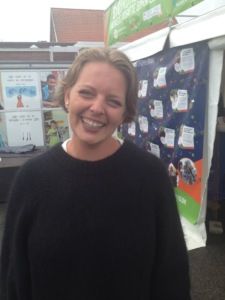News
Folkemødet: Not just for politicians
This article is more than 9 years old.
Amid all of the politicking and posturing, hundreds of NGOs and other organisations are trying to get their message heard above the noise

Ida Lissau Jacobsen’s welcoming smile makes it easy to stop and learn about Børnehjælpsdagen (photo: Ray Weaver)
Away from the platitudes and attitudes pouring off Folkemødet’s dozens of stages, the tents of the hundreds of organisations trying to get their messages out are staffed by eager and knowledgable volunteers anxious to tell their story.
Børnehjælpsdagen is one such organisation and Ida Lissau Jacobsen is one such volunteer. Børnehjælpsdagen has banded together with three other organisations to work on shedding light on the plight of socially exposed children who, for one reason or another, have been denied culturally normal interactions between themselves and the rest of society.
Small people, big dreams
Børnehjælpsdagen has a unique approach for getting kids who may not be accustomed to expressing their thoughts to open up.
“We ask them about their dreams,” said Jacobsen. “The things they wish for.”
Jacobsen said that asking children about their dreams is the place that she gets the most honest responses.
“Some of the children we are working for come from environments filled with violence or sexual abuse. That they can still sit down and say ‘I want to do this with my life’ is pretty amazing,” she said.
Bodies and minds
Jacobsen said that Børnehjælpsdagen’s most important job is to help children reach their goals, but that it often requires dealing with very basic life skills to help the children find their way to their larger goals.
“Some of the children we work with are not aware of their own body language. They do not know if they are too hot to too cold, or if their clothes do not fit,” she said.
“We do a lot of education about food and healthcare and how to stay healthy, because if they are physically strong it is easier for the other things to fall into place eventually.”
Jacobsen said that the message that she wanted to send to the curious passing by her tent at Folkemødet was a simple one.
“Take the children seriously.”










































